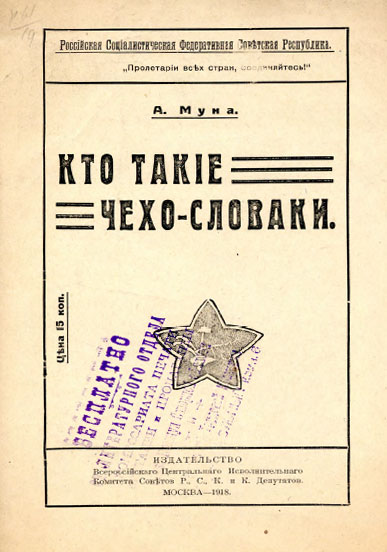

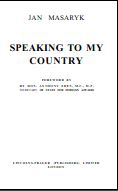
Keywords: World-War II; Czechoslovakia; Beneš;
Ian Masaryk, as the Minister for Foreign Affairs of the Czechoslovak Exile Government in London, had started at the beginning of World-War II a series of speaches, which were broadcasted every Wednesday by the B. B. C. Later, the intervals of the speaches became longer and mor irregular. In 1944 a collection of these speaches has been published in print by LINCOLNS-PRAGER (PUBLISHERS) LIMITED, London, with a foreword by Anthony Eden, the British Minister for Foreign Affairs. From A Eden's Foreword: "In this book we find Mr. Masaryk’s commentary on world events, delivered week by week as the war years unfolded. It was to him with his honoured name and reputation that his countrymen chiefly looked for truth and enlightenment on world affairs. In the midst of the spiritual and intellectual darkness which was, and still is, imposed on the occupied territories, the Czechoslovaks turned to Mr. Masaryk for the facts and for a reliable interpretation of those facts from the Czechoslovak standpoint. The present volume reveals the extent to which Mr. Masaryk met their need. Without doubt these talks have played a great part in maintaining the steadfast courage of the Czechoslovak people during their long ordeal." This file is a rer-digitized copy of the Lincolns-Prager book.
More...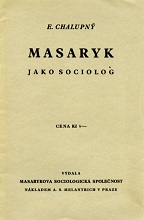
Keywords: Masaryk; Auguste Comte; Durkheim; Sombart; Giddings; Dilthey; Taine;
Digitized copy of the Booklet published in Prague 1937 by A. S. Melantrich Publisher. FOREWORD OF THE AUTHOR: During some celebrations of Masaryk, I was entrusted with the task of explaining the significance of his sociological work. In 1925 it was a joint meeting of the "Masaryk Sociological Society" and "Social Institute", which was founded on March 5, E. Štern about Masaryk as a Social Politician. In 1930, the celebration was held at the "Free School of Political Science" on March 11, with individual speeches (Dr. V. Joachim, Dr. K. Hoch, Dr. H. Trauba, Dr. MA Zimmermann and Dr. J. Folprechta) were published in 5th issue of 2nd annual volume of the "Free School of Political Science Magazine". In 1935 it was again a joint meeting of "Masaryk Sociological Society" and "Social Institute" on March 5, which, after my speech, lectured Dr. Ed. Beneš about Masaryk as a politician, and the celebrated meeting of "Free Schools Polit. nauk "on March 6 with Dr. V. Joachima, Dr. W. Wohryzka, Dr. K. Hoch, O. Graf and ms. Two of these speeches, which I have written in writing, I present here, and I also re-write the article from "New Freedom" 1925, which it expediently supplements; others were spoken with the floor and not enrolled. The first edition of this book was published in the diary "Tribune" on 6 and 7 March 1925, the second in the New Freedom Week of 1925, the third in the "Free School of Political Science Magazine." Because I have always tried to make it possible he did not repeat, on the contrary, that my own speeches about the same subject were supplemented, I hope that even in this overlapping overprint, the public will find the necessary lessons quite comprehensible.
More...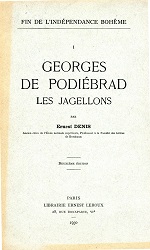
Keywords: Jan Hus; Ptatchek de Pirkstein; Lev de Rozmital; Jan Hlavsa; Bohemian Brethren;
In an earlier study, I wrote about the origins of the Hussite Reformation and the early struggles it sustained. I would like to tell one day the causes of the contemporary Renaissance, show the perseverance and heroic faith of Palatsky, his collaborators and his successors, the incredible difficulties overcome and the unexpected successes obtained. The task I undertake today is sadder: the Hussite and Protestant Reformation ends in abortion and disaster; What were the causes of this bankruptcy and the distant reasons for this defeat? By what faults did the Czechs deserve their misfortune? What was the share of responsibility of men and what, that of events? This is what I have tried to extract from the history of Bohemia in the 15th and 16th centuries.
More...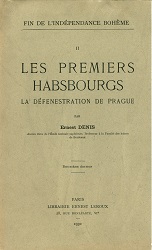
Keywords: Czech protestants; Maximilian I.; Ferdinand I.; Luther; Jan Hus; Utraquists;
More...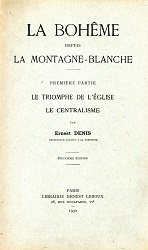
I intended to write a book in good faith. I always said what I believed to be the truth, even when I knew she would upset my dear friends; I have tried to judge without injustice the men who are most hateful to me. As for the serene indifference that a certain school claims to claim from historians, I do not believe it and I have never encountered it. Between executioners and martyrs, between tyrants and victims, it is not possible for me to remain neutral; I hate oppression in all its forms, I believe in the triumph of justice, and that is why the cause of Bohemia is dear to me. If she succumbs, which seems impossible to me, the share of inequity, already so great in the world, would be increased. // I did not cover up any of the mistakes of the Czech patriots; I still believe they wrote one of the most beautiful pages in human history. When the day comes when the nations, disillusioned with dreams of false glory, understand that the common interest requires respect for all freedoms, when enlightened consciences have broken the altars of false gods, we will place in the first row of evocative of the new world the Dobrovsky, the Havlíček and the Palacký. They taught us the power of law and the power of dedication; to triumph over the belated hatreds which persist in contesting a victory which is now certain, the Czechs have only to draw inspiration from their lessons. For me, I am convinced that by spreading their names and their doctrines, I will have contributed to uplift the souls of all who will read me and to free them from the prejudices of hatred and pride.
More...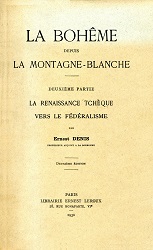
I intended to write a book in good faith. I always said what I believed to be the truth, even when I knew she would upset my dear friends; I have tried to judge without injustice the men who are most hateful to me. As for the serene indifference that a certain school claims to claim from historians, I do not believe it and I have never encountered it. Between executioners and martyrs, between tyrants and victims, it is not possible for me to remain neutral; I hate oppression in all its forms, I believe in the triumph of justice, and that is why the cause of Bohemia is dear to me. If she succumbs, which seems impossible to me, the share of inequity, already so great in the world, would be increased. // I did not cover up any of the mistakes of the Czech patriots; I still believe they wrote one of the most beautiful pages in human history. When the day comes when the nations, disillusioned with dreams of false glory, understand that the common interest requires respect for all freedoms, when enlightened consciences have broken the altars of false gods, we will place in the first row of evocative of the new world the Dobrovsky, the Havlíček and the Palacký. They taught us the power of law and the power of dedication; to triumph over the belated hatreds which persist in contesting a victory which is now certain, the Czechs have only to draw inspiration from their lessons. For me, I am convinced that by spreading their names and their doctrines, I will have contributed to uplift the souls of all who will read me and to free them from the prejudices of hatred and pride.
More...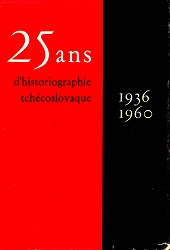
Keywords: Czechoslovak Historiography;
Published in 1960 by the Historical Department of the Czechslovak Academy of Sciences ( NAKLADATELSTVÍ ČESKOSLOVENSKÉ AKADEMIE VÉD )
More...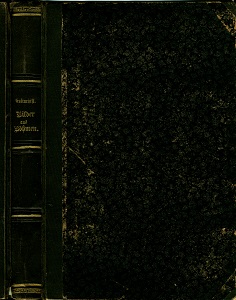
Keywords: Bohemian Culture;
THE DIGITIZED ORIGINAL WAS PRINTED IN GERMAN FRAKTURA FONT. BEFORE YOU DECIDE TO BUY THE e-BOOK VERSION, PLEASE TAKE A LOOK INTO THE FREE INTRODUCTION.PDF TO MAKE SURE, THAT YOU’LL BE ABLE TO READ THE TEXT. - The book is presenting a collection nof essays which had been published since late 1860s in the Feuilleton of the »Prager Zeitung«. The essays are focussing on public phenomena of cultural life and spirit which only rarely become a topic in the discourses on political culture. Already in the 1830s the historian Kopitar has seen, that thze Bohemians might have a history of Hussitism, but not a hgistory of Culture.
More...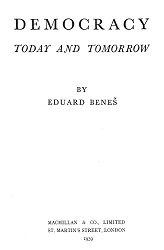
Keywords: 1938 Munich Agreement; Czech exile government; Third Reich attack on Ctechoslovakia;
«This book contains, without any major changes, my lectures on the problems of democracy, which were delivered at the University of Chicago in March, April and May, 1939. I could wish that I had had more time to complete, or, at least, to adapt some chapters of rhe book for the enlightenment of European readers. Though that has not been possible, I am glad to have the opportunity this preface provides to add a few words for my British readers.» (from Beneš' Introduction) // Original Publication in 19349 by MACMILLAN & CO., LIMITED, London 1939
More...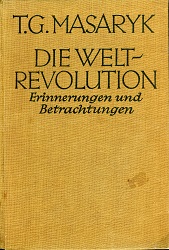
Keywords: foundation of Czechoslovakia;
Published in German edition by Erich Reiss Verlag, Berlin 1927 Original title; «Svĕtová revoluce» 1925 - translated for the English edition into «The Making of a State» 1927 // FROM MASARYK’s INTRODUCTION: I have reported here on my activities abroad during the world revolution in the years 1914 to 1918. I only report the main things. There was so much work outside that I couldn't keep a complete diary; I only wrote down short notes, usually just keywords and names, also in fear that they might fall into enemy hands. I had to be prepared for the records to be lost (an attempt was made to steal them) and not to compromise the people with whom I was in contact. That's why even today the actual comments are not all clear to me, and some details have been omitted. My notes from Russia and my documents, although hidden, were searched out after my departure from there and officially (ť) confiscated
More...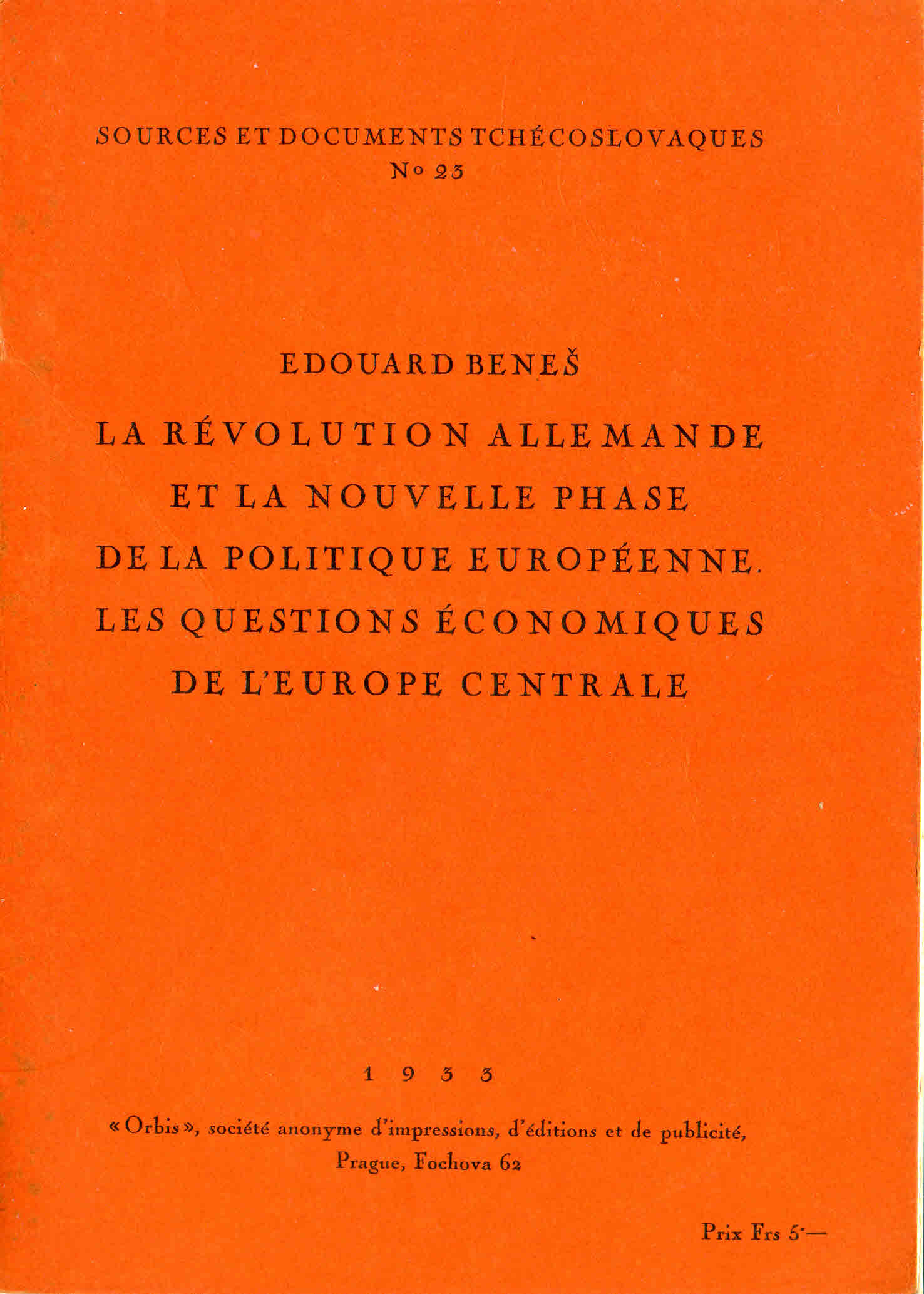
Keywords: League of Nations; NAZI-Germany and Czechoslovakia;
Germany's recent decision to leave the Conference on Disarmament and its rupture with the League of Nations constitute an event of such significance that our government has deemed it necessary to tell our Legislative Assemblies at least the most essential on the attitude it adopts in the face of the current international situation. It is understandable that at a time when the situation is not completely clarified, when a general emotion reigns in public opinion, and given that it is our immediate neighbor, with whom we have had until now good neighborly relations, I will maintain a certain reserve in my presentation, asking the Members of the Foreign Affairs Committee to impose the same reserve in the discussion. Let us be keen not to further complicate the present situation and, on the contrary, to seek a reasonable solution. // Presentation by Edvard Beneš to the parliamentary Commission for Foreign Affairs on October 3, 1933 // Pusblished by ORBIS PUBLISHING HOUSE
More...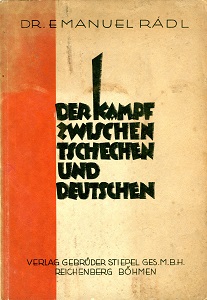
Only step by step did I work my way out of the prevailing anti-German ideology and that is why I understand those who cannot free themselves from it. It is not enough to claim that you are not a “chauvinist,” that “patriotism is a vanquished point of view,” that you “do not hate the Germans,” etc. Many people allow themselves to be put to sleep by such empty phrases, so that they do not see that how deeply they are immersed in nationalism despite all their supposed tolerance. Because intolerance is deeply instilled in us and overcoming it requires more than just average, bourgeois “justice”. We must free ourselves from the fear that truth and justice can harm our interests; constant tolerance in practice and, above all, getting to know each other are required. Knowing how difficult it is to overcome national prejudices, I have no illusions about the success of this book. I know that I am not writing to thank many readers, even if I am not thinking about the agitators. But I know that I am right.
More...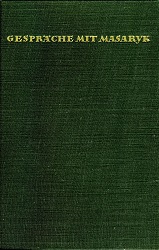
The following conversations were held at Lany Castle near Prague in German and were only slightly changed by the President during the review, but were deepened by longer theoretical insertions, especially in the third part. Where the spoken word remains unchanged, the character of the speaker shines through. For this time too, I was less interested in a statesman's position on all sorts of questions that he answered in his deeds and works than in a sketch of his character, which here, as everywhere else, best emerges from direct statements. A series of popular or original phrases, even in the revision, show how he answered my questions with immediate freshness. Despite his handling of philosophical categories, one will find great simplicity of expression. A 16 year old can understand each of the following pages; They are less suitable for writers and party people. This time too I didn't give the lead to the typical topics of freedom, socialism, technology and the like; They make the whole thing monotonous, turning the lively conversation into a debate. // PUBLISHED in 1935 by QUERIDO, Amsterdam
More...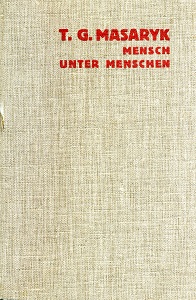
These stories about the great thinker and statesman Masaryk are a small contribution to the portrait of Masaryk as a man, who - as the anecdotes show quite clearly - was and is great even in the little things of everyday life
More...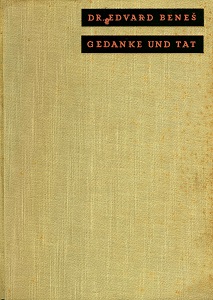
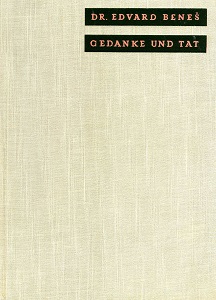
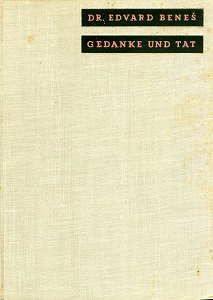
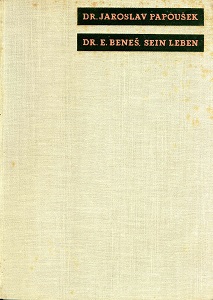
Masaryk - Beneš, How different personalities and yet how similar in origin, performance, willingness to sacrifice, courage, will, way of thinking. Personalities who complemented each other so much in fighting and working for the state. Apparitions, different in age, temperament and personal fate, but united by a friendship that arose from the agreement of goals and from the common struggle and the common devotion to the people and the state. Just as little can be said about their personal joys and sufferings, so much can be said about their work for the nation, state and humanity. That is why their biographies are so closely linked to the development of the people, to their struggles and successes. When Masaryk retired into private life, he recommended Beneš as his successor. He said, “I know him.” He could say this with greater certainty than most others. They had both thought, created and fought together for more than twenty years. This book is dedicated to this joint work, insofar as it was carried out by Beneš, which perhaps lists his services to the people and the state all too objectively and certainly only does partial justice to the topic. But at least this brief summary of biographical data sufficiently illustrates how and why, over the course of thirty years, the country child and student Beneš became a statesman of world renown and the successor to the president-liberator.
More...
Keywords: Prague Spring; Prague 1968; Democratic socialism:
Au moment où le « Printemps de Prague » atteignait son apogée, je reçus à la rédaction des Literarni Listy la visite d’un communiste italien, venu au nom d’une importante maison d’édition proche du Parti communiste italien. U m’expliqua que les communistes et les gens de gauche, en Italie, s'intéressaient vivement au déroulement des événements de Tchécoslovaquie et considéraient que l'expérience tchécoslovaque présentait un intérêt exceptionnel pour une perspective socialiste européenne. Us suivaient assidûment les extraits de la presse tchécoslovaque qui leur parvenaient en traduction, ce qui avait suscité, tout particulièrement dans les milieux intellectuels, le désir de mieux connaître, et si possible dans sa teneur intégrale, le contenu des discussions de principe qui se déroulaient dans les pages des Literarni Listy.
More...